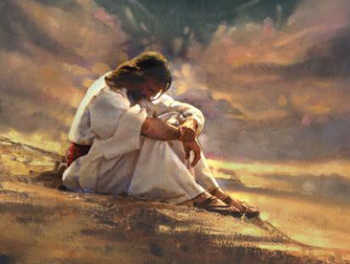 “In it he also went to preach to the spirits in prison, who had once been disobedient.”
“In it he also went to preach to the spirits in prison, who had once been disobedient.”
These words are hidden right in the middle of the readings for Mass today, in the second reading. It would be easy to miss. Most people would skim over these words and go on to the more well-known stories in the bible. Like the story about Noah and his family surviving the great flood. And, how the rainbow became a sign of God’s covenant with mankind, to never destroy all life on the earth again.
If you read the gospel today too, then you know it is one of the more well-known stories about Jesus’s life. It was about the forty days that he spent in the desert and was tempted by the devil. We are always reminded of this story during the forty days of Lent. Lent itself is like an annual desert experience for us as well, if you are fasting, giving up some of your comforts in life, and praying more. That’s exactly what Jesus did in his desert experience too.
However, there are other subtle themes that run through all three of the readings for Mass today too: temptation, sin, repentance and redemption.
The first reading from the book of Genesis doesn’t mention that God destroyed all life on the earth because of His anger over mankind’s wickedness and sins, but that’s why He did it. God got so mad that He destroyed them all, and they deserved it. However, He regretted His decision and swore to never do it again. Not only did God decide to never do it again, He later provided a way to redeem mankind from his sins.
This is why Catholics believe that the death penalty is wrong, by the way. God Himself regretted killing mankind in the early development of His relationship with humans. It is a primitive instinct in us as well, to want to kill criminals who have committed serious crimes too. We think they deserve it. In light of eternity though, that’s the easy way out. We should take a hint from God Himself, that destroying life because of serious sin is wrong, and we should work toward overcoming this disordered instinct within ourselves. A far more difficult thing to do, is to work toward a criminal’s conversion, repentance and reconciliation with God. This is the exact same process that we would want for ourselves too, if we were in their shoes.
Something to keep in mind though, is that all of the people who died in the great flood had varying degrees of sin. Those with little sin on their soul, and those with great sins on their soul, were equally destroyed. In God’s eyes they deserved it. We warrant the same treatment. We are all sinners, both great and small. One mortal sin totally severs our relationship with God. Once you are cut off from God, you are permanently cut off, no matter how many additional mortal sins you commit afterwards. The damage is already done. And, we’ve all been there. Each and every one of us have severed our relationship with God at some point in our lives, by committing a mortal sin.
The second reading started by saying this though:
“Christ suffered for sins once, the righteous for the sake of the unrighteous.”
And we are not righteous. Not a single one of us is perfectly holy in God’s eyes. All we have to do is spend some extended time alone in silence and solitude, like Christ did in the desert, to discover our own inner demons, character flaws, weaknesses and failings. We distract ourselves so much of the time, in order to avoid facing these ugly facts that lie hidden just beneath the surface of our awareness. A lot of people are not comfortable being alone for any extended amount of time for this reason. They need other people to affirm and distract them, from the realities within themselves that they do not want to face.
However, a good thing we might be able to do for Lent this year, is to create some space for silence in our lives. Turn off the television and the music during Lent. Get away from the computer more and go do some manual labor, conducting our work in silence. It’s amazing the things you discover about yourself, your relationships with others, and your relationship with God, when you eliminate the constant noise and distractions. And that includes eliminating our time in conversation with others sometimes too. Jesus withdrew from people, noise, and distractions during the time he spent in the desert too.
It is not selfish to withdraw from others, to seek silence, solitude and a little more time in prayer from time to time. On the contrary, in the long run, it can help us to become better people. That is really what Lent is all about. Facing our inner character flaws, sins, and failings, in order to face the fact that there is nothing that we can do on our own to make things right in our lives again. Only Jesus can. This verse in today’s second reading for Mass sums up in one simple sentence, what Lent is really all about:
“Christ suffered for sins once, the righteous for the sake of the unrighteous, that he might lead you to God.”
